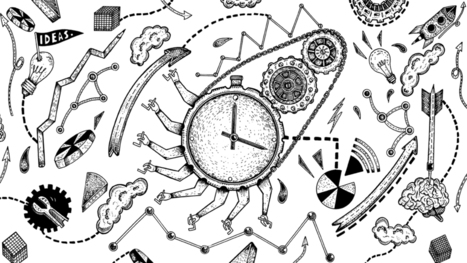 Your new post is loading...
 Your new post is loading...
If you want to hold brainstorms that unearth better, more creative ideas, it all starts with the number of people in the room. That’s my first tip for you: Follow the “pizza rule” for brainstorming. If you’re unfamiliar with the “pizza rule,” it’s the idea that if you have more people in a room than you could feed with a pizza, there are too many people in that room to hold a productive meeting. The same rule goes for a brainstorming session: If you’ve got a dozen people sitting around a table, expect a really long list of truly mediocre ideas. So, what else can you do other than bribe a group of two to six people with pizza to unearth good ideas? So glad you asked.
Via The Learning Factor
What are the defining attributes of great leaders? That's the age-old question thought leaders and scholars galore have been attempting to answer in mountains of books and literature. While great leadership, to an extent, can be personal and subjective to the follower, there are universal principles you can't argue with (but you can try). Speaking of those thought leaders and scholars, here are six traits that keep surfacing over and over again in the leadership literature and best-sellers. 1. They challenge their own assumptions.Great leaders may be smart and know a lot, but they are humble enough to recognize there are smarter people in the room that they can learn from. They don't restrict themselves from opinions and input outside of their own. They surround themselves with diverse perspectives to help them answer questions like, "How do I know my decision is the right one?" or "Is there a better course of action here?"
Via The Learning Factor
Here’s a grim stat: More than half of your staff is ready to leave the company, finds a recent Gallup poll. Vacancies impact the productivity and bottom line of your company, but a survey from Globoforce’s Work Human Research Institute uncovered a reason people stick around. When asked the question, “What makes you stay at your company?” the number-one answer, representing 32% of respondents, was, “My job–I find the work meaningful.” “Having a personal sense of meaning in one’s work was even more important than compensation, which ranked as the third most important reason for staying,” says Eric Mosley, CEO of Globoforce, a talent engagement software provider. The trick is that meaning means different things to different people, says Becky Frankiewicz, president of the staffing and talent management provider ManpowerGroup North America. “Our NextGen Work research found that Boomers value being appreciated and recognized, younger people look for purposeful work that contributes to society, while people of all generations desire work that allows them to improve their skills and balance work and home,” she says. “Taking the time to find out what motivates your people individually is the first step to helping them find meaning in what they do.”
Via The Learning Factor
You’re sitting there at your desk with a pit in your stomach. You know you really blew it–and your boss does, too. Maybe you forgot to follow up with an important client and they chose someone else’s proposal. Maybe you didn’t prepare the right documents in time for a super-important meeting. Or a careless typo you made on a spreadsheet or purchase order led to an expensive mistake. Whatever it is, your boss isn’t happy. That’s the bad news. The good news is that you don’t need to start job-searching. In fact, there are a few simple steps you can take right away to rebuild the trust you’ve lost–as quickly as humanly possible. Here’s what to do and when to do it.
Via The Learning Factor
Some people just seem to bounce back from whatever life throws at them. Whether it’s illness, loss, or tragedy, they do the tough work of picking themselves up, dusting themselves off, and carrying on—even when it seems impossible. If you’ve ever thought, “I could never do that” when looking at one of these apparent “superheroes,” don’t be so sure. It’s actually possible to build resilience to make yourself better able to bounce back from even the most difficult times. “It’s the ability to get back in the game after you’ve had some sort of failure. And indeed, we can learn to become more resilient,” says social scientist and leadership expert Frank Niles, PhD. Niles says there are a number of science-backed areas people can address to help them be more resilient. Here are some ways you can shore up your “resilience bunker” to better prepare for when tough times strike.
Via The Learning Factor
New research shows that it may not be the sound itself that distracts us…it may be who is making it. In fact, some level of office banter in the background might actually benefit our ability to do creative tasks, provided we don’t get drawn into the conversation. Instead of total silence, the ideal work environment for creative work has a little bit of background noise. That’s why you might focus really well in a noisy coffee shop, but barely be able to concentrate in a noisy office. One study, published in the Journal of Consumer Research, found that the right level of ambient noise triggers our minds to think more creatively. The researchers, led by Ravi Mehta of the University of Illinois Urbana-Champaign, examined various levels of noise on participants as they completed tests of creative thinking.
Via The Learning Factor
Psychologist John Gottman can predict whether or not a married couple will be together five years later with startling 90 percent accuracy. How does he do it? He watches them argue. The ability to engage in healthy, productive debate is not only essential for ensuring a long marriage--it's also the key determinant of high performing teams. A recently released six-year study cites the ability to manage conflicting tensions as the most critical predictor of top-team performance. Berkeley research shows teams that debate their ideas have 25 percent more ideas altogether and that companies like Pixar embrace healthy debate as a vital part of their performance (in its case to make better films).
Via The Learning Factor
Being more productive is about working smarter, not harder, and making the most of each day. While this is no easy feat, getting more done in less time is a much more attainable goal if you’re not sabotaging yourself with bad habits. Following are 16 things you should stop doing right now to become more productive.
Via The Learning Factor
You can feel it start to happen–at first slowly, then all at once. You get a little bit tired and before you know it, you’re mindlessly scrolling your Facebook feed. You’re distracted and spent–you just can’t handle another minute of real work. You’ve hit the mid-afternoon slump. “Most of us are sitting all day, staring at a computer screen highly focused… you can’t sustain that for long,” says internist Lorraine Maita, MD, author of How To Live Younger. “At about 3:00 or 4:00 p.m., your cortisol starts to drop.” While our automatic reaction might be to reach for a bag of Sun Chips and watch a random YouTube clip, those behaviors will only prolong the slump. You will be better off if you try to reset your body and mind to help you regain focus. Maita recommends a number of activities, including listening to upbeat music or breathing deeply for a few minutes, to re-energize the body. Below are few more examples of how to get your focus back.
Via The Learning Factor
As entrepreneurs, we often work late into the night, only to roll out of bed the next morning, picking up where we left off. One day bleeds into the next, making it seem as if we're always doing, doing, doing and searching for new and novel ways to do more. The truth is, your desire to do more and get more done will lead you not toward greater productivity, but toward burnout, if you don't take time each day to check in with yourself, and set your intention for how you want your day to proceed. Abraham Lincoln is credited with saying, "If I had six hours to cut down a tree, I'd spend the first four sharpening the axe." There is no evidence to suggest that Lincoln actually said this, but the point is not lost on us. How we prepare to do the task before us determines our success.
Via The Learning Factor
More of us are now awakening to the fact that workplaces are not quite the places of productivity that we hoped them to be. But that they are actually rife with distraction. Not to mention the painful hours of commuting tacked onto long days at the office. All this can be avoided with a flexible work arrangement, and that's an option that many are seeking nowadays. According to a recent FlexJobs survey on remote work, 66% of professionals believed that they would be more productive if they worked remotely - instead of at a traditional office. The reasons cited in favor of remote work? 76% wanted "fewer interruptions from colleagues and fewer distractions," 70% sought to "reduce stress from commuting," and 69% preferred to avoid "office politics."
Via The Learning Factor
You have three outstanding assignments sitting on your desk, your phone is lighting up with texts from your roommate reminding you of that party you don’t want to attend, and then your boss swings by to ask if you can stay late to help out on seven other tasks that need finishing. Before you can stop yourself, “Uh, sure! I mean, of course,” tumbles out of your mouth. You know full well that you’re unable to handle another thing, but there’s just something about saying no that’s almost impossible to do.
Via The Learning Factor
To effectively lead and motivate employees, you don’t need charisma and a grand vision. Research from Michigan State University (MSU) found that being a successful boss was more about mind over matter. The study, published in the journal Organizational Behavior and Human Decision Processes, found that a leader’s focus, or mind-set, affects his or her own behavior, which in turn affects employees’ motivation. And the good news is that your mind-set can be changed to produce certain outcomes from workers, from creativity to loss prevention. “Effective leadership may be based in part on a leader’s ability to recognize when a particular mental state is needed in their employees and to adapt their own mental state and their behaviors to elicit that mind-set,” says Brent Scott, MSU professor of management and study coauthor. “Part of the story here is that you don’t have to be Steve Jobs to be an effective leader. There is no one-size-fits-all approach to managing.”
Via The Learning Factor
|
Running a successful organization requires lots of moving pieces running smoothly in tandem. At the heart of every organization are people just like you and me, whose performance can be influenced in a positive direction. Recently, companies like Google and Facebook have been redefining the standards of workplace culture, and in turn seeing improvements in employee satisfaction and company performance. Now, your company might not be large enough to have a dedicated HR (or “People Ops”) department, but there are some exciting takeaways from social psychology that you can apply to benefit your business. Reciprocity Principle Reciprocity is one of the famous “Six Principles of Persuasion” defined in Robert B. Cialdini, Ph.D.'s book, Influence: The Psychology of Persuasion. The idea is that we feel pressure to repay others for what they have given us or done for us. We often even give back more than we were initially given to minimize any guilt associated with the initial favor. Founders and CEOs can use this to their advantage. Internally, this can help improve or repair work relationships, win over co-workers and build consensus. As Dr. Cialdini writes, reciprocity is so powerful that it can overcome feelings of suspicion or dislike toward the person who gives the gift or favor. As a small business owner, how about giving gifts or bonuses on holidays or birthdays? You could also offer to bring back coffee for the office or surprise your colleagues with breakfast or lunch. A kind gesture can go a long way. Outside the office, the reciprocity principle can help you succeed in negotiations, build valuable business partnerships and win over investors — or even customers! When we launched our product and were at our first trade show full of retail managers and buyers, we realized that people only stopped at our booth if we handed them a free sample. So we handed samples to everyone who walked by! In turn, they stopped, listened to our pitch, and 99% of the time they placed an order for their store. In those first few hours, we sold over 100 cases into 100 new stores.
Via The Learning Factor
To make a good decision, you need to have a sense of two things: how different choices change the likelihood of different outcomes and how desirable each of those outcomes is. In other words, as Ajay Agrawal, Joshua Gans, and Avi Goldfarb have written, decision making requires both prediction and judgment. But how do you get better at either? We’ve published volumes on this subject —here are a few of my favorites — but there are three rules that stand out. Following them will improve your ability to predict the effects of your choices and assess their desirability. Rule #1: Be less certain.Nobel-prize-winning psychologist Daniel Kahneman has said that overconfidence is the bias he’d eliminate first if he had a magic wand. It’s ubiquitous, particularly among men, the wealthy, and even experts. Overconfidence is not a universal phenomenon — it depends on factors including culture and personality — but the chances are good that you’re more confident about each step of the decision-making process than you ought to be. So, the first rule of decision making is to just be less certain — about everything. Think choice A will lead to outcome B? It’s probably a bit less likely than you believe. Think outcome B is preferable to outcome C? You’re probably too confident about that as well. Once you accept that you’re overconfident, you can revisit the logic of your decision. What else would you think about if you were less sure that A would cause B, or that B is preferable to C? Have you prepared for a dramatically different outcome than your expected one? You can also practice aligning your level of your confidence to the chance that you’re correct. Try out quizzes like this one or this one. You’ll realize that while it’s not possible to always be right, it’s totally possible to become less overconfident.
Via The Learning Factor
Behind every great athlete there is an even greater coach. There isn't a top athlete--from Muhammad Ali to Tiger Woods to Serena Williams--who did not need a mentor to help them reach the top of their profession. If you think about it, your business is similar to that of an elite athlete. You may have the drive, the skills, and the vision, but there are times when you need professional guidance to ensure you stay on the right path, and how to best utilize your talents and work on your shortcomings in order to reach your goals. An executive coach can be that person. No matter where you are on your career path--from eager up-and-coming manager to a seasoned senior executive to an entrepreneur--there will be times when you can benefit from some professional coaching.
Via The Learning Factor
Tis the season for stress. The holidays are crazy enough, but add in year-end deadlines and sales goals, performance reviews, and the news of yet another raise not given, and you can already feel your blood pressure rise. But there’s good news: You can still stay healthy, even when work is insane. It’ll just take a little extra effort. “When stress takes over, often the first things to go are the ones we need the most–sleep, water, exercise, whole nutritious foods,” laments nutritionist Brigitte Zeitlin. “And that can actually compound the issue, leaving you less equipped to handle the stress well.” Here’s exactly what you can do to keep that from happening before work gets really crazy.
Via The Learning Factor
Some people just seem to bounce back from whatever life throws at them. Whether it’s illness, loss, or tragedy, they do the tough work of picking themselves up, dusting themselves off, and carrying on—even when it seems impossible. If you’ve ever thought, “I could never do that” when looking at one of these apparent “superheroes,” don’t be so sure. It’s actually possible to build resilience to make yourself better able to bounce back from even the most difficult times. “It’s the ability to get back in the game after you’ve had some sort of failure. And indeed, we can learn to become more resilient,” says social scientist and leadership expert Frank Niles, PhD. Niles says there are a number of science-backed areas people can address to help them be more resilient. Here are some ways you can shore up your “resilience bunker” to better prepare for when tough times strike.
Via The Learning Factor
Are you a micromanager? You will probably say no. Maybe you self-deprecatingly call yourself a “control freak.” Or just “hands-on.” You just “care too much.” And it’s true: You do feel a certain need for a sense of control over your work. You are responsible, after all–perhaps more responsible than some of your coworkers or direct reports. You’re afraid of mistakes and believe that if something needs to be done well, you’d better do it yourself. But this isn’t just because you’re an “independent self-starter” who holds their work to a high standard. It might be that, too, but it’s probably also because you’re feeling stressed.
Via The Learning Factor
Some days you get to work early, work nonstop, and head home without being able to figure out what you actually accomplished. Everything rushes past you in a blur of emails, meetings, and errands, and your to-do list remains more or less untouched. You’re always going to have a few workdays like this no matter what you do. But if they start happening regularly, you may have a problem on your hands. If that’s the case, then it’s time to start looking for systematic failures, not just one-off fumbles. And ironically enough, the best place to look may be at your to-do list itself. What better record do you have of the tasks that you’re consistently failing to achieve? These are a few common to-do list items that might be getting in the way of your more important goals. If you can cut them out–even just for a day or two–you may be able to regain your footing.
Via The Learning Factor
Defined hierarchy. Commanding leadership. These corporate ligaments secure firms in the face of threats and unify them against competition. Few beliefs are more widely held in business. The intuition, though, is wrong. “When you look at real organizations, having a clear hierarchy within your firm actually makes people turn on each other when they face an outside threat,” says Lindred Greer, a professor of organizational behavior at Stanford Graduate School of Business. Effective teamwork against threats requires not hierarchy, but egalitarianism; not centralized power, but a culture in which all voices count. Along with Lisanne van Bunderen of the University of Amsterdam and Daan Van Knippenberg of Drexel University, the research team teased out this finding through two complementary studies. In the first study, an experiment, teams of three students developed and pitched a consultancy project to a prospective client. Some of these teams were non-hierarchical, while members of other teams arbitrarily received titles: senior consultant, consultant, junior consultant. Likewise, some teams faced no rivals, while others were told they were competing with a rival firm for clients. The researchers found that the subset of hierarchical teams facing competition with rival firms struggled with infighting while the egalitarian teams cooperated on their work.
Via The Learning Factor
What comes to mind when you hear the term “facilitator”? A task manager hogging airspace up at the front of the room? Or thoughts like, “Ugh–okay, how do I get out of attending this workshop?” But done right, facilitation isn’t about boring presentations. It’s a process for getting groups of people together to solve any problem. Good facilitators know how to jump right in, establish an objective, create a format packed with interactive opportunities for discussion, and lead groups of all sizes toward constructive solutions. And you don’t need a specific job title or a certain amount of experience to become an effective facilitator–you just have to develop a set of skills that gives structure and purpose to the otherwise unruly art of collaboration. As workplaces become less hierarchical and more reliant on interpersonal problem-solving, rather than just tactical execution, facilitation is becoming a job skill you’ll need to rely on more and more. Here’s what you need to know to get started developing it.
Via The Learning Factor
Mindfulness has become the corporate fad du jour, a practice widely touted as a fast-track to better leadership. But we suspect that not all the benefits laid at its feet actually belong there. Our research and analysis has revealed a complicated relationship between mindfulness and executive performance—one that is important for leaders to understand as they seek to develop in their careers. Mindfulness is a method of shifting your attention inward to observe your thoughts, feelings, and actions without interpretation or judgment. A mindfulness practice often begins simply by focusing on your breath, noticing when your mind wanders, and then bringing it back to your breath. As you strengthen your ability to concentrate, you can then shift to simply noting your inner experience without getting lost in it at any point in your day. The benefits attributed to this kind of practice range from stronger relationships with others to higher levels of leadership performance.
Via The Learning Factor
From having fewer bad habits to being proactive and procrastinating less often, the advantages of being a morning person have been well covered. You could chalk it up to circadian rhythm, but it could be because morning people leverage the unique characteristics of the morning that help us all be at our best, says Josh Davis, author of Two Awesome Hours: Science-Based Strategies to Harness Your Best Time and Get Your Most Important Work Done. “People who get up early in the morning are hitting it out of the park, doing things we struggle with at other times of the day,” he says. “If we can be amazing at certain times of the day there must be associated psychological conditions. Morning offers several benefits that can’t be found at other times of the day.” Shifting your schedule might take some adjustment, but it’s worth it. Here are four productivity-related advantages that naturally occur in the morning:
Via The Learning Factor
Getting smart people into your company is hard enough. Turning them all into great collaborators and risk-takers is even harder. Even on the most high-performing teams, coworkers don’t just openly share feedback and challenge each others’ ideas all on their own–managers need to create a culture that encourages this. And that usually requires building your team’s collective emotional intelligence. Here are a few straightforward (and entirely low-tech ways) to get started.
Via The Learning Factor
|



 Your new post is loading...
Your new post is loading...
















































You can’t always pull creativity out of thin air, but you can design situations that foster creative ideas.
As a High D/I on the DiSC model I've always loved a good brainstorming session. Nice little article to get you thinking and perhaps change things up a little in the boardroom. Also check out Edward De Bono's 6 Thinking Hats book - fast and effective way to problem solve involving brainstorming that you might also like to read. Have a great week ahead.